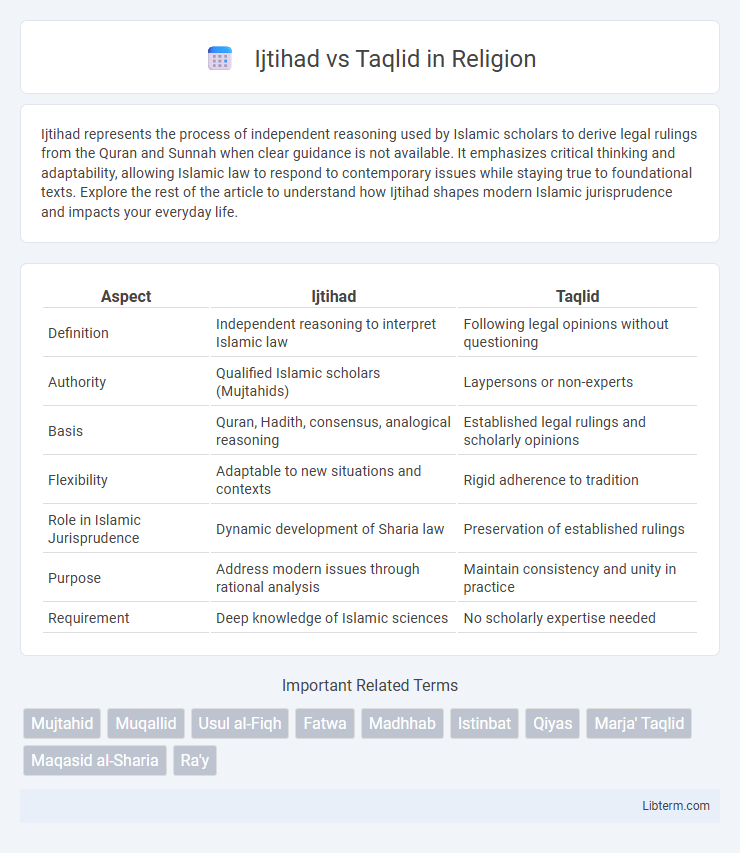Ijtihad represents the process of independent reasoning used by Islamic scholars to derive legal rulings from the Quran and Sunnah when clear guidance is not available. It emphasizes critical thinking and adaptability, allowing Islamic law to respond to contemporary issues while staying true to foundational texts. Explore the rest of the article to understand how Ijtihad shapes modern Islamic jurisprudence and impacts your everyday life.
Table of Comparison
| Aspect | Ijtihad | Taqlid |
|---|---|---|
| Definition | Independent reasoning to interpret Islamic law | Following legal opinions without questioning |
| Authority | Qualified Islamic scholars (Mujtahids) | Laypersons or non-experts |
| Basis | Quran, Hadith, consensus, analogical reasoning | Established legal rulings and scholarly opinions |
| Flexibility | Adaptable to new situations and contexts | Rigid adherence to tradition |
| Role in Islamic Jurisprudence | Dynamic development of Sharia law | Preservation of established rulings |
| Purpose | Address modern issues through rational analysis | Maintain consistency and unity in practice |
| Requirement | Deep knowledge of Islamic sciences | No scholarly expertise needed |
Understanding Ijtihad: Definition and Scope
Ijtihad refers to the process of independent reasoning used by qualified Islamic scholars to interpret and apply Sharia law when clear guidance is absent in foundational texts. Unlike Taqlid, which involves strict adherence to established scholarly opinions, Ijtihad demands deep expertise in Quranic principles, Hadith, jurisprudence, and linguistic nuances to derive rulings. The scope of Ijtihad extends to addressing new issues in contemporary contexts while maintaining fidelity to Islamic legal and ethical frameworks.
Taqlid: Meaning and Historical Context
Taqlid refers to the practice of following established legal opinions and rulings in Islamic jurisprudence without independent reasoning, often relying on the interpretations of qualified scholars. Historically, Taqlid became prominent after the classical period of Islam when the development of fixed legal schools (madhabs) provided structured guidance to ensure consistency and avoid errors in religious rulings. This reliance on Taqlid helped preserve the integrity of Islamic law across diverse communities and periods, maintaining unity within the legal tradition.
Quranic Foundations of Ijtihad
Ijtihad is firmly grounded in Quranic principles, emphasizing personal reasoning and interpretation of divine guidance when explicit texts are absent or ambiguous. Verses such as Surah An-Nisa (4:59) call for obedience but also highlight the importance of scholarly judgment, underscoring the Quranic endorsement of legal reasoning within Islamic jurisprudence. The Quran's encouragement to contemplate, reflect, and seek knowledge forms the foundational basis for Ijtihad's role in evolving legal and ethical rulings in Islam.
Origins and Evolution of Taqlid
Taqlid originated in early Islamic communities as a means to maintain religious unity by adhering to the established interpretations of qualified scholars (mujtahids). Over centuries, the practice evolved into a rigid adherence to classical juristic opinions, often limiting individual reasoning and reinterpretation of Islamic law. This institutionalization of Taqlid contrasted with Ijtihad, which emphasizes independent legal reasoning and adaptation to contemporary issues.
Key Differences: Ijtihad vs Taqlid
Ijtihad involves independent reasoning by qualified Islamic scholars to interpret Shariah law, while Taqlid means adhering strictly to established legal opinions without questioning. Ijtihad requires deep knowledge of Quran, Hadith, and jurisprudence, enabling scholars to address new issues, whereas Taqlid emphasizes following traditional rulings for continuity and stability. The key difference lies in the dynamic, context-driven analysis of Ijtihad versus the replicative imitation characteristic of Taqlid.
Role of Scholars in Ijtihad and Taqlid
Scholars play a crucial role in Ijtihad by employing independent reasoning to interpret Islamic law in response to new issues, ensuring the religion remains relevant and adaptable. In contrast, Taqlid relies on scholars as authoritative figures whose interpretations and rulings are followed without questioning, emphasizing preservation of established legal opinions. The dynamic interaction between scholarly expertise in Ijtihad and adherence in Taqlid shapes the evolution and continuity of Islamic jurisprudence.
Ijtihad in Modern Islamic Thought
Ijtihad in modern Islamic thought represents the dynamic process of independent reasoning to interpret Islamic law in contemporary contexts, allowing flexibility and adaptability in addressing new social, political, and technological challenges. Contemporary scholars emphasize Ijtihad as essential for reconciling traditional jurisprudence with modern values, fostering progressive legal reforms while maintaining fidelity to the Quran and Sunnah. This approach contrasts with Taqlid, which advocates strict adherence to classical interpretations, often criticized for hindering intellectual and legal development in the Muslim world.
The Debate: Benefits and Challenges of Taqlid
Taqlid involves adherence to established Islamic legal opinions, providing consistency and accessibility for laypersons who lack expertise in jurisprudence. It offers the benefit of preserving tradition and preventing misinterpretation, but may also limit individual reasoning and adaptability to new contexts. Challenges arise in balancing respect for authority with the need for contextual ijtihad to address evolving social and legal issues effectively.
Contemporary Issues: Ijtihad vs Taqlid in Practice
Contemporary debates on Ijtihad versus Taqlid emphasize the need for dynamic interpretation of Islamic law to address modern challenges such as bioethics, financial technology, and human rights. Ijtihad empowers qualified scholars to derive rulings based on contextual understanding, promoting adaptability, while Taqlid entails adherence to established jurisprudence, ensuring continuity and stability. The balance between innovative legal reasoning and tradition influences governance, social reforms, and legal pluralism in many Muslim-majority societies.
The Future of Islamic Jurisprudence: Balancing Ijtihad and Taqlid
The future of Islamic jurisprudence hinges on balancing ijtihad, the independent reasoning and reinterpretation of Sharia, with taqlid, adherence to established legal precedents and scholarly consensus. Emphasizing ijtihad allows for dynamic adaptation to contemporary issues while maintaining the core principles of Islamic law, whereas taqlid ensures continuity and respect for centuries of jurisprudential scholarship. Integrating both approaches can foster a more flexible yet grounded legal framework that addresses modern challenges without compromising traditional values.
Ijtihad Infographic

 libterm.com
libterm.com